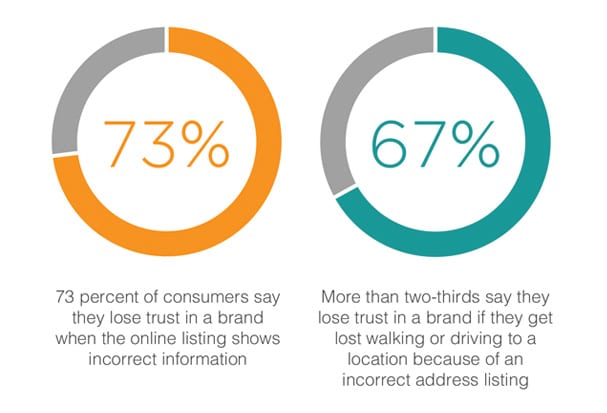Local profiles and directory listings have become increasingly important factors in determining a firm's placement in search results. Search engines look to profile information to help display results that are relevant to each searcher's unique location.
Mobile device use is also driving a push toward smarter search results. According to BIA/Kelsey, mobile local search will overtake desktop local search by 2015. With the proliferation of mobile search and the availability of location-related data, where you exist physically affects what listings you will see.
Since people close to your office are more likely to see your site's listing, your contact information – often referred to as NAP (name, address, phone number) – must be accurate. And your NAP data must be consistent across sites you control and those you may not.
Keep the trust of prospective clients
A report released by Placeable, a company specializing in location-based data, confirms that consumers lose trust in brands that publish conflicting NAP data. According to its study, 73 percent of consumers lose trust in a business whose online listings show inaccurate information. And 67 percent say they lose trust if they get lost attempting to walk to drive to a business because of faulty listings.

Consumers are somewhat more forgiving if a third party site has incorrect or incomplete information. But a solid third – 31 percent – say they blame the business if a Yelp or other directory listing is wrong.
When consumers are frustrated in an attempt to find a business, they lose trust before the business even has a chance to earn it. Consider driving to a business that has moved or was never there in the first place. Where do you go next? Think of calling a service provider and getting a wrong or disconnected number, or looking at a business's Google + profile for their hours, then stopping by only to find the location is closed. All of these things erode the customer relationship before it has really begun.
Appear trustworthy to search engines
Incorrect, incomplete or conflicting address and contact information makes your firm appear less trustworthy to both people and search engines. Google looks at the variety of data being produced about your firm online to determine your site's credibility. If its web crawlers see multiple addresses for the same location or see your firm listed under different service categories across several directories, your site is less likely to rank well.
Search engine companies have a vested interest in providing searchers with relevant, helpful results. If as a rule Google returned only results of questionable accuracy, it would likely lose search volume – and also market value. Search engines are simply protecting their own bottom line by excluding untrustworthy sites.
Follow these basic tips to ensure you do not lose the trust of search engines or prospective clients:
- Place your address and phone number on your website. Be sure your phone number is shown prominently.
- Optimize your Google+ Local and Bing Local listings by providing as much information as possible. This includes choosing categories and uploading pictures.
- Perform searches for your firm to uncover unknown listings. Consider using a tool like Localeze to see where you are listed. Claim free directory listings, even if it requires a time commitment. At a minimum you will have control over the listings' contents.
- Ensure your firm is categorized correctly in all directory listings.
- Ensure your NAP data is the same everywhere.
According to SEO software developer Moz the first three of the top 20 Local Search Ranking Factors for 2013 were:
1. Proper category associations
2. Physical address in city of search
3. Consistency of structured citations
You will see a benefit from devoting time and energy to monitoring local listings. Given the consequences of errors for both search marketing and client trust, the effort is necessary.

